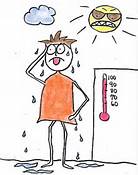Dehydration Signs and Symptoms
How to Detect Them
by Nancy Hearn, CNC
Note: As an Amazon Associate I earn from qualifying purchases.
Dehydration signs and symptoms are quite easy to detect. The degree of dehydration can be classified as mild, moderate and severe stages.
The stage of dehydration depends on the percentage of lost body weight, which is caused by fluid deprivation and excretion.
According to the Mayo Clinic, the average person loses about 8 to 10 cups of water every day through the normal processes of sweating, breathing, urinating and defecating.
Other factors such as illness, exercise, heat and overexertion can increase the loss of fluids in the body.
Initial Signs and Symptoms
One common initial sign of dehydration is the feeling of thirst. When water levels within the body dwindle, the feeling of thirst is generated to warn the body.
In other words, when you feel thirsty, you are already dehydrated!
Another early sign is the darkening of the urine’s color. These raise the body’s priority of water intake and water conservation.
Furthermore, body water loss raises other symptoms, such as lessening of urine frequency and amount, feeling of tiredness and weakness, mild to moderate headache, lightheadedness or dizziness, and drying of the lips, the mouth and the eyes.
In this phase, drinking constant and significant amounts of fluids can eliminate these dehydration signs and symptoms.
If left unchecked, this may affect the normal functioning of the kidney and could promote the formation of kidney stones, constipation, etc.
When to Seek Professional Advice
If consistent intake of fluids does not alleviate the dehydration signs and symptoms, it is best to seek medical help from specialists.
For babies suffering from frequent diarrhea (more than six instances within 24 hours), contact the family general practitioner immediately.
A urine test or a blood test may be administered. This will assess the body’s levels of salts, such as potassium and sodium.
Further Dehydration Signs
If dehydration is not treated at the moderate stage, it might go to the severe stage. This is considered as a serious emergency. The patient must be given proper medical attention immediately.
Contact the family or local general practitioner as soon as possible if one or more of these symptoms are observed:
- Increased levels of weakness and confusion
- Prolonged dizziness or lightheadedness especially when going into standing position
- Infrequent or no urine for the past eight hours
- A weak but rapid pulse rate
- Consciousness levels waning, and
- Seizures.
Inability to immediately treat dehydration at this stage could lead to further complications.
Infant Dehydration Signs
Babies who may be suffering from dehydration will exhibit some dehydration signs and symptoms such as:
- Little to no tears while crying
- Dark-colored urine
- Soft sunken spot on the head
- Dry mouth
- Increased breathing rate
- Cold hands and feet, and
- Drowsiness and infrequent urine.
Immediate reporting to the family general practitioner will prevent the complications of the baby’s dehydration issue.
Reference
National Health Services: Dehydration – Symptoms; 2015.
Further Reading
Dehydration Symptoms - Mild, Moderate and Severe
12 Symptoms of Chronic Dehydration
Return from Signs and Symptoms of Dehydration to Dehydration Effects

If you would like to reproduce or republish this article or any other article on this site, feel free to do so but please include a reference or link to the article at WaterBenefitsHealth.com.
Sign Up for Our Monthly
Newsletter
Visitor Comments
"This was the best and most straight forward info on the net yet. I asked a question and got an answer that made sense. Thank you so much!" - Linderlinder
FINALLY!!! I have been wondering about this for years with no 'solid' answer. This is exactly what I've been wanting to know! Thank you for this share..." by Andy
"Thank you for the information, Nancy. I appreciate it. Your article and findings are very helpful, referring to dehydration." - Carolyn
"Lemon water is one drink both my wife and I can't drink. It upsets our stomachs. We are in our sixties and in very good health—well, better health now that we drink about 2 liters plus of water each day. It has made so much difference to our digestive systems and recovery every day. Thank you for your website and effort." - Rod



